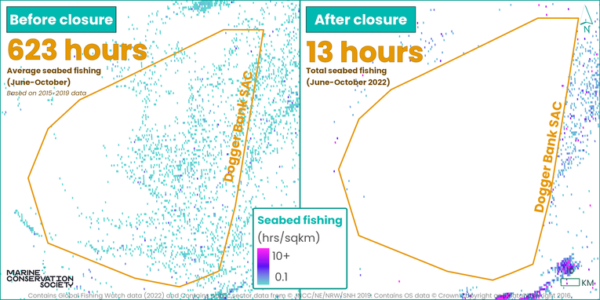The Dogger Bank marine protected area (MPA), has experienced a 98% decrease in bottom towed fishing since a ban was introduced, according to research by the Marine Conservation Society (MCS).
In June 2022, a byelaw came into force that banned damaging fishing activities from four English offshore MPAs.
Between June and October (2015-2019), an average of 623 hours of bottom-towed fishing took place within the English Dogger Bank MPA.
However, between June and October 2022, since the ban has been in place, fishing activity dropped to just 13 hours; a 98% decrease in seabed fishing.
Before closure: 623 hours of seabed fishing. After closure: 13 hours of seabed fishing.
Boulder drops and legal action
Until the ban, as the Independent has reported, fishing with bottom-towed gear could still take place – prompting Greenpeace in September 2020 to drop boulders into the sea as a barrier to fishing.
Back in 2019, groups launched a legal campaign against the breaking of habitat protection laws by allowing bottom trawling at the protected site.
Greenpeace report into UK MPAs
Separately, Greenpeace has released a report which analyses the UK’s network of MPAs to establish whether the government is on track to properly protect 30% of UK waters by 2030. Some of the key findings are:
- Over 90% of MPAs are protected in name alone, with no meaningful, site-wide regulation on the most destructive fishing activity.
- Just two MPAs in the entire network are fully protected from all fishing activity (a ‘no-take zone’) across their whole site.
- 32% of the UK’s MPAs have no restrictions on fishing in the majority of the site, meaning 122 so-called ‘protected’ areas are substantially open, year-round, to all types of destructive fishing.
- Over 60% of offshore MPAs are substantially open to all fishing activity year-round.
- Just five of the UK’s 76 offshore MPAs are protected against bottom towed gear – a type of fishing gear that can damage the seabed, devastate marine life and release the seabed’s stored carbon. Only two of these have site-wide protection.
- Only 8% of UK MPAs – an area of ocean the size of less than 0.1% of the UK’s EEZ – are fully closed to all bottom and pelagic towed fishing gear and can sustain ecosystem recovery. No offshore MPAs are fully closed to all towed gear.
Target to fully protect all English offshore MPAs before 2024
Jean-Luc Solandt, Principal MPA Specialist at the Marine Conservation Society, said: “The huge reduction in seabed fishing we’ve identified shows how effective governments can be in protecting our ocean. This needs to be replicated across all offshore MPA’s to help recover fish stocks, provide sanctuary for marine life, and protect sensitive habitats from destruction.
“Our ocean has an incredible ability to recover when it’s given a chance. The Government must meet its target to fully protect all English offshore MPAs before 2024. The sooner this happens, the sooner our seas can restore themselves.”
Further information can be found on the Marine Conservation Society website here.
